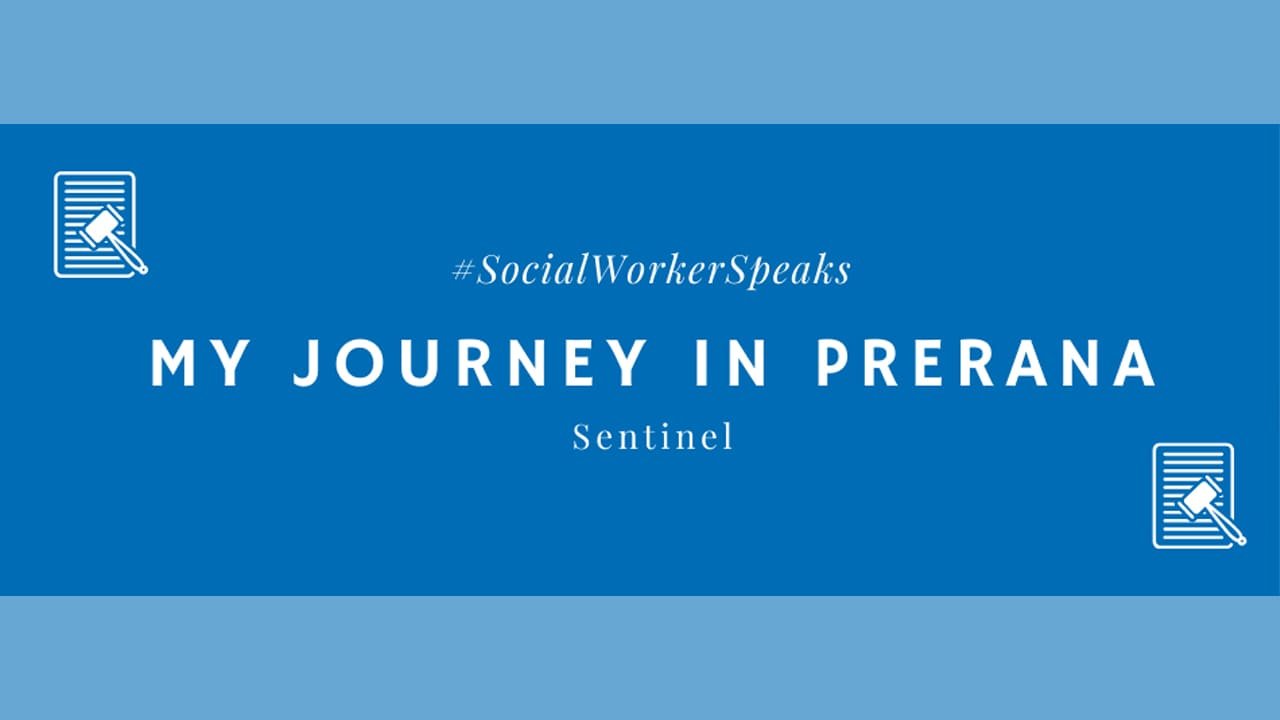Megha Gupta
Project Co-ordinator
It has been a year and a half since I started working with Prerana’s Post Rescue Operation Project that works with minor victims of commercial sexual exploitation. My work entails casework, assisting in research, visits to the Child Welfare Committee, and regular visits to Children’s Home where minor victims rescued from sex trafficking and commercial sexual exploitation are placed for their care and protection. Prerana’s PRO project aids the child’s rehabilitation by providing vocational, educational, medical, psycho-social and sometimes legal support.
The children living in the Children’s Home know me as their Social Worker didi – someone who assists them primarily through the Juvenile Justice System. Not many people know that I am a lawyer by training and qualification.
Although as a student of law, my interest was in understanding the legal text and its interpretation, when it came to its application, I always wanted to use it for something other than merely drafting contracts. That is precisely what I am trying to do here, at Prerana. My association with Prerana started 3 years ago with an internship as a law student. During the internship, I had the opportunity to understand Prerana’s on-field interventions, and the emphasis on keeping the child at the centre of all positive interventions. I learnt it as an intern, and it is something I have grown to implement in my work as a full-time employee.
Over the course of my time at Prerana, I have often been asked by people why I chose to not practice law. I remember this incident when a child got to know about my qualification as a lawyer, and she asked me, “Why are you my social worker didi and not my lawyer?” Like that child, it is difficult for most people to understand why someone with a law degree would choose to aid the child’s rehabilitation instead of strengthening prosecution. The question that perplexes them is why am I not aiding the delivery of justice? The question that perplexes me is why do they think I am not? Merely, because I am not appearing with a black gown in a courtroom?
For the longest period, justice in the form of conviction has been assumed to be the ultimate form of justice. The accused being convicted of the offence and sentenced to a stringent punishment is seen as the logical end. In the criminal justice system, heinous crimes of serious nature are treated as crimes against the society and not merely as offences against an individual. In such cases, the State becomes the universal victim. In India too, the offences pertaining to trafficking of persons for sexual exploitation are treated as a crime against the society and by extension, the State. Criminal jurisprudence often debates on the issue of who properly ‘owns’ the crime – the State or the persons against whom the crime was committed. It can be said that the former creates a giant and complex machinery to adjudicate the offence that it believes is committed against it. To do so, it invites the victim, be it an adult or a child, to participate in it in the name of delivering justice through its robust criminal justice system. In the process of obtaining conviction for the accused, one often tends to ignore the needs of the child victim. People often forget asking the child what his/her idea of justice is. For a child victim of commercial sexual exploitation and trafficking,already belonging to a marginalised and disintegrated society, access to justice might mean something else. The child victim and its need of justice gets lost or belittled in the procedure of justice and under the over-imposing structure of the trial.
There are times when the child might not want to be associated with the prosecution of the case as in arguing, presenting evidence, cross examining the witness, fixing the guilt and determining the punishment, etc. There are times when the child does not understand that his/her rights have been violated. During my time at Prerana, I have especially observed this in cases of intergenerational trafficking. In these cases, such offences have been normalised for the child by her own family under the garb of cultural practices. The abuse is so inherently ingrained that the child begins to internalize the offences, and does not want her family members to be punished, even if they are the ones responsible for her abuse in the first place. Developing an understanding in the child that she was the one wronged may take a long time. It is also difficult to expect the child to respond to prosecution in the way the State wants her to. I remember my colleague sharing an incident where after testifying against her own mother, the distraught child had asked “Didi, am I a bad person for saying those things against my mother? Her face looked pale and she looked much older after spending time in jail. Is she being treated badly? If I did not say those things, would my family have been together now?”
There are times when the child’s understanding of justice differs from that of the State. The child might want justice by accessing the opportunities s/he was denied so far. The child might wish to use these opportunities to complete his/her education and be reintegrated into the society. In such cases, it becomes challenging to answer if the child’s idea of justice should prevail or that of the criminal justice system.
In the anti-trafficking domain, the understanding of justice is also often limited to the ambit of prosecution but through my work on the field at Prerana, I have realised the fallacy of this argument. Prerana believes in protecting the rights of the victim by creating choices and restoring dignity. And the key to any successful intervention is understanding the needs of the child, and catering to the same. I do not mean to imply that trial in the court of law should be solely dependent on the child’s wish to prosecute or not. Due process of law should be followed, regardless of the child’s stance on prosecution but a child’s rehabilitation should not be peripheral to prosecution.
It took me a long time to accept that my initial understanding of justice in the conventional sense, i.e. conviction in the court of law, is not the only form of justice. This conscious decision was the product of unlearning years of learnings. My work at Prerana helps me see how the letter of the law is implemented on the field, and how justice is a much bigger word than it appears. If one continues to look at justice from the lens of the criminal justice system, the trial resulting in a conviction is the only form of victory. Maybe if we widen the lens to include justice in terms of the need of the child, the smallest positive intervention and its subsequent success in the child’s best interest becomes a win!






Follow